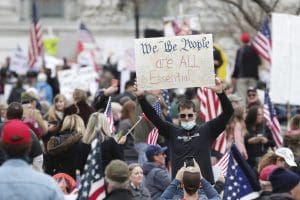Majority of Republicans oppose protests against stay-home orders
Donald Trump continues to urge people to demonstrate against states’ stay-at-home orders.

By a majority of 55% to 31%, most Americans disapprove of protests around the country demanding an end to social distancing rules. Republicans oppose them 51% to 32%.
The findings were part of an AP-NORC poll released Monday. Among Democrats, 67% oppose the protests and 25% support them.
The same survey found that 71% of Americans support requiring people to stay at home in most cases to curb the spread of the COVID-19 pandemic — with 57% support among Republicans.
The poll comes as Republican lawmakers across the country are attacking stay-at-home orders as an infringement of rights and economic suicide.
For weeks, Republicans in Congress have prioritized the economy over public health, demanding that businesses be allowed to reopen immediately, even if it means an increase in coronavirus cases and deaths.
Rep. Trey Hollingsworth (R-IN) said last month that while there was no “zero-harm choice,” it was “policymakers’ decision to put on our big boy and big girl pants and say, This is the lesser of these two evils. And it is not zero evil, but it is the lesser of these evils, and we intend to move forward in that direction. That is our responsibility, and to abdicate that is to insult the Americans that voted us into office.”
Sen. John Kennedy (R-LA) took a similar view. “The American people get it: We gotta reopen, and when we do, the coronavirus is gonna spread faster, and we gotta be ready,” he told Fox News in mid-April.
Last week, several Republican officials rushed to defend the owner of a Texas salon who repeatedly refused to keep her shop closed as required by a stay-at-home order set by Republican Gov. Greg Abbott. “Small-minded ‘leaders’ across the country have become drunk with power. This must end,” complained Rep. Dan Crenshaw (R-TX) after Shelley Luther was sentenced to seven days in jail for refusal to follow a court order. Lawmakers also accused Illinois Gov. JB Pritzker of violating “religious liberty” by enforcing a limit on gatherings, including at churches, during the crisis.
Experts say that stay-at-home orders are essential to slow the spread of the coronavirus. “[T]he most important thing is to make sure people stay at home, stay six feet away from each other. That’s how you slow the spread,” Surgeon General Jerome Adams told NBC News in April.
Despite warnings that reopening too quickly could “backfire,” some places have already begun easing their rules. Some of these states, including Texas and Tennessee, have already seen spikes in the number of new cases.
Donald Trump continues to demand that states reopen immediately and to push for more people to protest against Democratic governors who are maintaining stay-at-home orders.
On Monday, he tweeted falsely that the “great people of Pennsylvania want their freedom now, and they are fully aware of what that entails.” He charged, “Democrats are moving slowly, all over the USA, for political purposes. They would wait until November 3rd if it were up to them. Don’t play politics. Be safe, move quickly!”
On May 1, Trump expressed support for an armed mob of protesters who stormed Michigan’s Capitol, demanding that Gov. Gretchen Whitmer give in to their demands. “The Governor of Michigan should give a little, and put out the fire,” he tweeted. “These are very good people, but they are angry. They want their lives back again, safely! See them, talk to them, make a deal.”
In April, Trump egged on protesters in states with Democratic governors, urging them to “liberate” themselves from safety rules.
More than 26,000 new cases of the coronavirus and 1,700 new deaths were reported in the United States on Sunday. Still, Trump tweeted Monday, “Coronavirus numbers are looking MUCH better, going down almost everywhere. Big progress being made!”
Published with permission of The American Independent Foundation.
Recommended

Biden campaign launches new ad focused on Affordable Care Act
Former President Trump has said he wants to do away with the popular health care law.
By Kim Lyons, Pennsylvania Capital-Star - May 08, 2024
Ohio doctors fear effects of emergency abortion care case set to go before U.S. Supreme Court
A federal law that allows emergency departments to treat patients without regard to their ability to pay will be under U.S. Supreme Court scrutiny this week, and Ohio doctors are concerned about the case’s local impact on emergency abortion care.
By Susan Tebben, Ohio Capital Journal - April 23, 2024
House GOP votes to end flu, whooping cough vaccine rules for foster and adoptive families
A bill to eliminate flu and whooping cough vaccine requirements for adoptive and foster families caring for babies and medically fragile kids is heading to the governor’s desk.
By Anita Wadhwani, Tennessee Lookout - March 26, 2024









































































